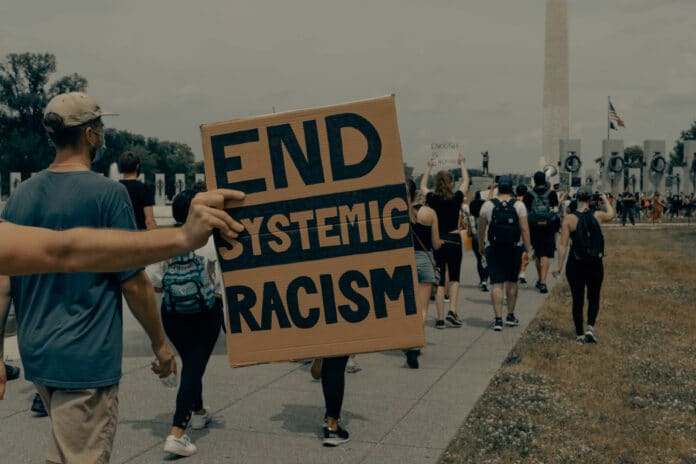
(RealClearWire) — The real problem with racism in America today is that demand far outstrips supply. Where does the demand come from? Chiefly from our woke elites. It is they who understand that the charge of “racism” is a potent meal ticket and guarantor of institutionalized political power. Accordingly, they have a large stake in perpetuating the reign of racism. In this realm, too, incentives matter.
It is also worth noting that many of these elite race cadets are white. Blacks are invited to participate in this theatrical production, but only so long as they play their assigned roles. They must mouth the pieties about “systemic,” i.e., perpetual, incurable racism.
The main narrative of this drama is racial conflict, enforced and perpetuated partly by a woke media machine, partly by governmental fiat. The real goal is the destruction of America as a meritocratic republic that cherishes individual liberty and the rule of law.
These are points that Thomas D. Klingenstein makes in “Racism in America Today: A Real or Manufactured Problem?”, a powerful speech he delivered at the Women’s National Republican Club earlier this summer and just posted on his website at tomklingenstein.com.
“To a very significant degree,” he argues, racism is a weapon “crafted by woke Leftists in order to overthrow the American way of life.”
Klingenstein, chairman of the Claremont Institute, is refreshingly forthright. “To the woke Left I say, ‘if you want to destroy America, then we will fight you and defeat you. America is not yours to destroy.’” Hear, hear.
This speech is full of hard truths. “Blacks commit more than 50% of the violent crime in America,” Klingenstein notes, “yet are only about 13% of population. The woke tell us this is due to racism, but Americans know better. We know that racism does not cause more crime, or out-of-wedlock births, or lower academic achievement.”
And here’s the kicker: “It is not racism but culture that causes outcome differences. But the woke make it very difficult for the rest of us to say it, because if it’s culture that explains outcome differences then the blame rests not on whites but on blacks.” That grinding sound you hear is The Narrative coming unglued.
Klingenstein is also clearsighted about the ultimate aim of the woke weaponization of race: “group outcome equality.” Most Americans, he points out, believe in color-blind advancement according to merit. Hence “these two goals are utterly irreconcilable. You can’t offer admission to college, medical school, law school, flight training, or anything else according to race and other quotas and, at the same time, offer admission according to merit. It’s one or the other: merit or group quotas.”
Klingenstein is right: “These irreconcilable goals make this struggle a war,” a war in which “the woke Left seeks total victory.” We do not often acknowledge the uncompromising nature of this ideology. What it wants is not compromise, and certainly not conciliation. What it wants is the utter destruction of its enemy, which is us.
This generally unacknowledged home truth helps to explain why the word “racism” silences conversation and sends an anticipatory shudder of delight down the spines of politically correct vigilantes of virtue. Like the word “heretic” in an earlier age, “racism” is more weapon than word. Its primary effect is not to describe but to intimidate, ostracize, and silence.
What semantic significance it may command is overshadowed by its use as an epithet. Once it is successfully applied to a person or practice, a sort of secular damnation, or at least excommunication, ensues. Seldom is there any appeal, let alone absolution. Those who blaspheme against the Holy Spirit, said St. Mark, cannot be forgiven. Racism is the eternal, the unforgivable, sin of our age. Those successfully accused of racism are beyond the pale, cast out into utter darkness.
It would be a tall order to explain why this should be so, but it seems clear, as Klingenstein notes, that charges of racism and the pursuit of power go hand in hand.
The deployment of power always attracts acolytes and entrepreneurs. So it is no surprise that a thriving cottage industry has grown up around accusations of racism. Elsewhere I have called the resulting enterprise “Racism, Inc.” There is no shortage of workers on that assembly line. On college campuses (but not only on college campuses, as such names as Al Sharpton and Ibram X. Kendi remind us), the bludgeon of “racism” is a popular and effective instrument of moral one-upmanship and social control, not to mention intellectual conformity and economic blackmail.
Given the prominence of “racism” in today’s lexicon of moral opprobrium, it is curious that the word itself is of very recent vintage. Indeed, it is a neologism so recent that it does not appear in the 1971 Oxford English Dictionary. The Supplement to my edition of the OED (printed in 1961) introduces “racialism” — the “tendency to racial feeling; antagonism between different races of men” — but fails to provide an equivalent of our multipurpose imprecation “racism.”
Perhaps that fact is itself evidence of a particularly insidious form of racism — all the more insidious because it is unacknowledged. Or perhaps that fact, along with the recentness of the word in any currency, suggests that there is something artificial, manufactured, or even cynically manipulative about the tort it describes.
Klingenstein’s speech reminded me of a profound observation made some years ago by the philosopher Sidney Hook. “As morally offensive as is the expression of racism wherever it is found,” Hook wrote, “a false charge of racism is equally offensive, perhaps even more so, because the consequences of a false charge of racism enable an authentic racist to conceal his racism by exploiting the loose way the term is used to cover up his actions.”
Hook wrote that several decades ago. Tom Klingenstein reminds us that we have yet to catch up with it.
This article was originally published by RealClearPolitics and made available via RealClearWire.
Roger Kimball
Roger Kimball is editor and publisher of The New Criterion and the president and publisher of Encounter Books. He is the author and editor of many books, including The Fortunes of Permanence: Culture and Anarchy in an Age of Amnesia (St. Augustine's Press), The Rape of the Masters (Encounter), Lives of the Mind: The Use and Abuse of Intelligence from Hegel to Wodehouse (Ivan R. Dee), and Art's Prospect: The Challenge of Tradition in an Age of Celebrity (Ivan R. Dee).
















